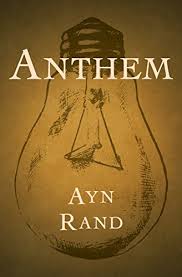Anthem Page #4
Anthem is a dystopian fiction novella by Russian-American writer Ayn Rand, written in 1937 and first published in 1938 in the United Kingdom. The story takes place at an unspecified future date when mankind has entered another Dark Age.
“It is forbidden,” they answered. We said: “The Council does not know of this hole, so it cannot be forbidden.” And they answered: “Since the Council does not know of this hole, there can be no law permitting to enter it. And everything which is not permitted by law is forbidden.” But we said: “We shall go, none the less.” They were frightened, but they stood by and watched us go. We hung on the iron rings with our hands and our feet. We could see nothing below us. And above us the hole open upon the sky grew smaller and smaller, till it came to be the size of a button. But still we went down. Then our foot touched the ground. We rubbed our eyes, for we could not see. Then our eyes became used to the darkness, but we could not believe what we saw. No men known to us could have built this place, nor the men known to our brothers who lived before us, and yet it was built by men. It was a great tunnel. Its walls were hard and smooth to the touch; it felt like stone, but it was not stone. On the ground there were long thin tracks of iron, but it was not iron; it felt smooth and cold as glass. We knelt, and we crawled forward, our hand groping along the iron line to see where it would lead. But there was an unbroken night ahead. Only the iron tracks glowed through it, straight and white, calling us to follow. But we could not follow, for we were losing the puddle of light behind us. So we turned and we crawled back, our hand on the iron line. And our heart beat in our fingertips, without reason. And then we knew. We knew suddenly that this place was left from the Unmentionable Times. So it was true, and those Times had been, and all the wonders of those Times. Hundreds upon hundreds of years ago men knew secrets which we have lost. And we thought: “This is a foul place. They are damned who touch the things of the Unmentionable Times.” But our hand which followed the track, as we crawled, clung to the iron as if it would not leave it, as if the skin of our hand were thirsty and begging of the metal some secret fluid beating in its coldness. We returned to the earth. International 4-8818 looked upon us and stepped back. “Equality 7-2521,” they said, “your face is white.” But we could not speak and we stood looking upon them. They backed away, as if they dared not touch us. Then they smiled, but it was not a gay smile; it was lost and pleading. But still we could not speak. Then they said: “We shall report our find to the City Council and both of us will be rewarded.” And then we spoke. Our voice was hard and there was no mercy in our voice. We said: “We shall not report our find to the City Council. We shall not report it to any men.” They raised their hands to their ears, for never had they heard such words as these. “International 4-8818,” we asked, “will you report us to the Council and see us lashed to death before your eyes?” They stood straight all of a sudden and they answered: “Rather would we die.” “Then,” we said, “keep silent. This place is ours. This place belongs to us, Equality 7-2521, and to no other men on earth. And if ever we surrender it, we shall surrender our life with it also.” Then we saw that the eyes of International 4-8818 were full to the lids with tears they dared not drop. They whispered, and their voice trembled, so that their words lost all shape: “The will of the Council is above all things, for it is the will of our brothers, which is holy. But if you wish it so, we shall obey you. Rather shall we be evil with you than good with all our brothers. May the Council have mercy upon both our hearts!” Then we walked away together and back to the Home of the Street Sweepers. And we walked in silence. Thus did it come to pass that each night, when the stars are high and the Street Sweepers sit in the City Theatre, we, Equality 7-2521, steal out and run through the darkness to our place. It is easy to leave the Theatre; when the candles are blown out and the Actors come onto the stage, no eyes can see us as we crawl under our seat and under the cloth of the tent. Later, it is easy to steal through the shadows and fall in line next to International 4-8818, as the column leaves the Theatre. It is dark in the streets and there are no men about, for no men may walk through the City when they have no mission to walk there. Each night, we run to the ravine, and we remove the stones which we have piled upon the iron grill to hide it from the men. Each night, for three hours, we are under the earth, alone. We have stolen candles from the Home of the Street Sweepers, we have stolen flints and knives and paper, and we have brought them to this place. We have stolen glass vials and powders and acids from the Home of the Scholars. Now we sit in the tunnel for three hours each night and we study. We melt strange metals, and we mix acids, and we cut open the bodies of the animals which we find in the City Cesspool. We have built an oven of the bricks we gathered in the streets. We burn the wood we find in the ravine. The fire flickers in the oven and blue shadows dance upon the walls, and there is no sound of men to disturb us. We have stolen manuscripts. This is a great offense. Manuscripts are precious, for our brothers in the Home of the Clerks spend one year to copy one single script in their clear handwriting. Manuscripts are rare and they are kept in the Home of the Scholars. So we sit under the earth and we read the stolen scripts. Two years have passed since we found this place. And in these two years we have learned more than we had learned in the ten years of the Home of the Students. We have learned things which are not in the scripts. We have solved secrets of which the Scholars have no knowledge. We have come to see how great is the unexplored, and many lifetimes will not bring us to the end of our quest. But we wish no end to our quest. We wish nothing, save to be alone and to learn, and to feel as if with each day our sight were growing sharper than the hawk’s and clearer than rock crystal. Strange are the ways of evil. We are false in the faces of our brothers. We are defying the will of our Councils. We alone, of the thousands who walk this earth, we alone in this hour are doing a work which has no purpose save that we wish to do it. The evil of our crime is not for the human mind to probe. The nature
Translation
Translate and read this book in other languages:
Select another language:
- - Select -
- 简体中文 (Chinese - Simplified)
- 繁體中文 (Chinese - Traditional)
- Español (Spanish)
- Esperanto (Esperanto)
- 日本語 (Japanese)
- Português (Portuguese)
- Deutsch (German)
- العربية (Arabic)
- Français (French)
- Русский (Russian)
- ಕನ್ನಡ (Kannada)
- 한국어 (Korean)
- עברית (Hebrew)
- Gaeilge (Irish)
- Українська (Ukrainian)
- اردو (Urdu)
- Magyar (Hungarian)
- मानक हिन्दी (Hindi)
- Indonesia (Indonesian)
- Italiano (Italian)
- தமிழ் (Tamil)
- Türkçe (Turkish)
- తెలుగు (Telugu)
- ภาษาไทย (Thai)
- Tiếng Việt (Vietnamese)
- Čeština (Czech)
- Polski (Polish)
- Bahasa Indonesia (Indonesian)
- Românește (Romanian)
- Nederlands (Dutch)
- Ελληνικά (Greek)
- Latinum (Latin)
- Svenska (Swedish)
- Dansk (Danish)
- Suomi (Finnish)
- فارسی (Persian)
- ייִדיש (Yiddish)
- հայերեն (Armenian)
- Norsk (Norwegian)
- English (English)
Citation
Use the citation below to add this book to your bibliography:
Style:MLAChicagoAPA
"Anthem Books." Literature.com. STANDS4 LLC, 2025. Web. 10 Mar. 2025. <https://www.literature.com/book/anthem_329>.








Discuss this Anthem book with the community:
Report Comment
We're doing our best to make sure our content is useful, accurate and safe.
If by any chance you spot an inappropriate comment while navigating through our website please use this form to let us know, and we'll take care of it shortly.
Attachment
You need to be logged in to favorite.
Log In